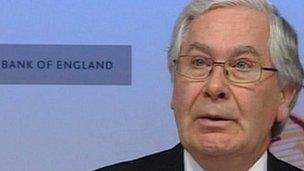King backs ECB reluctance to buy Italian debt
- Published
- comments

Mervyn King says stronger economies should lend in an explicit way instead
Although the UK is not in the euro, what the Governor of the Bank of England has to say about the eurozone's crisis will resonate, simply because he is one of the big global figures in central banking.
He is, for example, the new chair of all the important economic and supervisory committees at the Bank for International Settlements, in succession to Jean-Claude Trichet.
So it matters that he has given unambiguous support for the European Central Bank's reluctance to bail out "deficit" countries, such as Italy and Spain, which are having growing difficulties borrowing from the private sector.
He says that it is for the stronger eurozone governments to lend in an explicit and visible way to the likes of Italy and Spain, and not to try to hide from their electorates what they are doing by putting pressure on the central bank to provide the necessary finance.
Or to put it another way (which he didn't, but I am), it is largely down to Germany - the biggest and strongest economy in the eurozone - to provide a backstop of emergency financial support for the deficit countries, during the several years that it will take for Italy, Spain, Portugal and so on to rebuild the competitiveness of their respective private sectors, so that they'll be able to pay their way in the world.
With every German central banker saying more-or-less the same, this is probably the final nail in the coffin of the notion that the European Central Bank could use its own resources to become the so-called lender of last resort to governments experiencing serious funding challenges.
Which is quite different from the kind of small-scale intervention in bond markets that we've seen again today from the ECB - with the ECB attempting to push down the yield or implicit interest rate on Italian and Spanish bonds by buying those bonds.
Initially this morning the ECB succeeded in pushing up the price of Spanish and Italian bonds, and therefore the yields on the bonds fell a bit.
But it is disturbing that as soon as there is a hiatus in those ECB purchases, the relevant bond prices fall again. As I write, the implicit interest rate for 10-year Italian debt is nudging the punitive and unaffordable 7% threshold again.
To use the dreadful cliche, there will be no significant pause in this crisis unless and until a firewall is erected around Italy's and Spain's funding requirements - which in turn means that the eurozone's bailout fund, the European Financial Stability Facility, has to have its effective resources boosted to well over a trillion euros, perhaps to as much as 3tn euros.
Some of that may be achievable through clever financial engineering. But it is difficult to see how it can be done unless and until Germany feels comfortable mortgaging its own balance sheet more for the benefit of its Latin neighbours.